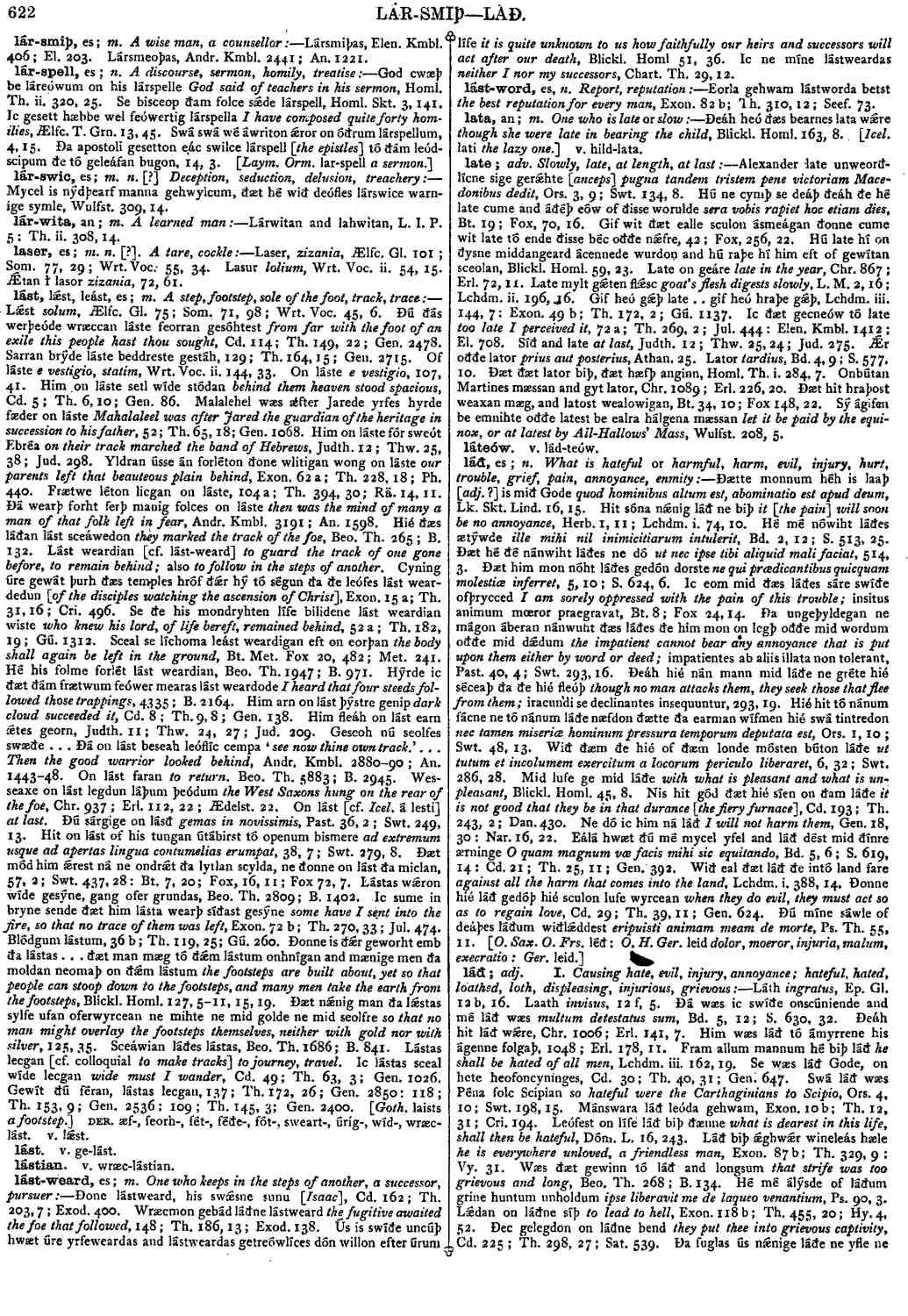lást
- noun [ masculine ]
-
Lǽst
solum,
- Ælfc. Gl. 75 ;
- Som. 71, 98 ;
- Wrt. Voc. 45, 6 .
-
Ðú ðás werþeóde wræccan láste feorran gesóhtest
from far with the foot of an exile this people hast thou sought,
- Cd. 114 ;
- Th. 149, 22 ;
- Gen. 2478 .
-
Sarran brýde láste beddreste gestáh,
- 129 ;
- Th. 164, 15 ;
- Gen. 2715 .
-
Of láste
e vestigio, statim,
- Wrt. Voc. ii. 144, 33 .
-
On láste
e vestigio,
- 107, 41 .
-
Him on láste setl wíde stódan
behind them heaven stood spacious,
- Cd. 5 ;
- Th. 6, 10 ;
- Gen. 86 .
-
Malalehel wæs æfter Jarede yrfes hyrde fæder on láste
Mahalaleel was after Jared the guardian of the heritage in succession to his father,
- 52 ;
- Th. 65, 18 ;
- Gen. 1068 .
-
Him on láste fór sweót Ebréa
on their track marched the band of Hebrews,
- Judth. 12 ;
- Thw. 25, 38 ;
- Jud. 298 .
-
Yldran ússe in forléton ðone wlitigan wong on láste
our parents left that beauteous plain behind,
- Exon. 62 a ;
- Th. 228, 18 ;
- Ph. 440 .
-
Frætwe léton licgan on láste,
- 104 a ;
- Th. 394, 30 ;
- Rä. 14, 11 .
-
Ðá wearþ forht ferþ manig folces on láste
then was the mind of many a man of that folk left in fear,
- Andr. Kmbl. 3191 ;
- An. 1598 .
-
Hié ðæs láðan lást sceáwedon
they marked the track of the foe,
- Beo. Th. 265 ;
- B. 132 .
-
Lást weardian [cf. lást-weard]
to guard the track of one gone before, to remain behind; also to follow in the steps of another. Cyning úre gewát þurh ðæs temples hróf ðǽr hý tó ségun ða ðe leófes lást weardedun [of the disciples watching the ascension of Christ ],
- Exon. 15 a ;
- Th. 31, 16 ;
- Cri. 496 .
-
Se ðe his mondryhten lífe bilidene lást weardian wiste
who knew his lord, of life bereft, remained behind,
- 52 a ;
- Th. 182, 19 ;
- Gú. 1312 .
-
Sceal se líchoma leást weardigan eft on eorþan
the body shall again be left in the ground,
- Bt. Met. Fox 20, 482 ;
- Met. 241 .
-
Hé his folme forlét lást weardian,
- Beo. Th. 1947 ;
- B. 971 .
-
Hýrde ic ðæt ðám frætwum feówer mearas lást weardode
I heard that four steeds followed those trappings,
- 4335 ;
- B. 2164 .
-
Him arn on lást þýstre genip
dark cloud succeeded it,
- Cd. 8 ;
- Th. 9, 8 ;
- Gen. 138 .
-
Him fleáh on lást earn ǽtes georn,
- Judth. 11 ;
- Thw. 24, 27 ;
- Jud. 209 .
-
Gescoh nú seolfes swæðe ... Ðá on lást beseah leóflíc cempa
'see now thine own track.' ... Then the good warrior looked behind,
- Andr. Kmbl. 2880-90 ;
- An. 1443-48 .
-
On lást faran
to return.
- Beo. Th. 5883 ;
- B. 2945 .
-
Wesseaxe on lást legdun láþam þeódum
the West Saxons hung on the rear of the foe,
- Chr. 937 ;
- Erl. 112, 22 ;
- Ædelst. 22 .
-
On lást [cf. Icel. á lesti]
at last.
Ðú sárgige on lásð
gemas in novissimis,
- Past. 36, 2 ;
- Swt. 249, 13 .
-
Hit on lást of his tungan útábirst tó openum bismere
ad extremum usque ad apertas lingua coutumelias erumpat,
- 38, 7 ;
- Swt. 279, 8 .
-
Ðæt mód him ǽrest ná ne ondrǽt ða lytlan scylda, ne ðonne on lást ða miclan,
- 57, 2 ;
- Swt. 437, 28 :
- Bt. 7, 20 ;
- Fox, 16, 11 ;
- Fox 72, 7 .
-
Lástas wǽron wíde gesýne, gang ofer grundas,
- Beo. Th. 2809 ;
- B. 1402 .
-
Ic sume in bryne sende ðæt him lásta wearþ síðast gesýne
some have I sent into the fire, so that no trace of them was left,
- Exon. 72 b ;
- Th. 270, 33 ;
- Jul. 474 .
-
Blódgum lástum,
- 36 b ;
- Th. 119, 25 ;
- Gú. 260 .
-
Ðonne is ðǽr geworht emb ða lástas... ðæt man mæg tó ðǽm lástum onhnígan and mænige men ða moldan neomaþ on ðǽm lástum
the footsteps are built about, yet so that people can stoop down to the footsteps, and many men take the earth from the footsteps,
- Blickl. Homl. 127, 5-11, 55, 59 .
-
Ðæt nǽnig man ða lǽstas sylfe ufan oferwyrcean ne mihte ne mid golde ne mid seolfre
so that no man might overlay the footsteps themselves, neither with gold nor with silver,
- 125, 35 .
-
Sceáwian láðes lástas,
- Beo. Th. 1686 ;
- B. 841 .
-
Lástas lecgan [cf. colloquial to make tracks] to journey, travel. Ic lástas sceal wíde lecgan
wide must I wander,
- Cd. 49 ;
- Th. 63, 3 ;
- Gen. 1026 .
-
Gewít ðú féran, lástas lecgan,
- 137 ;
- Th. 172, 26 ;
- Gen. 2850 :
- 118 ;
- Th. 153, 9 ;
- Gen. 2536 :
- l09 ;
- Th. 145, 3 ;
- Gen. 2400.
Bosworth, Joseph. “lást.” In An Anglo-Saxon Dictionary Online, edited by Thomas Northcote Toller, Christ Sean, and Ondřej Tichy. Prague: Faculty of Arts, Charles University, 2014. https://bosworthtoller.com/21193.
Checked: 1